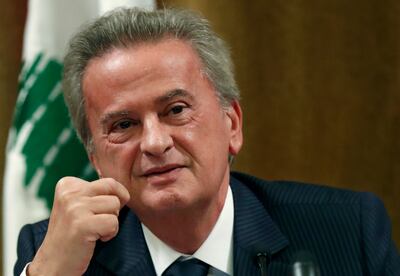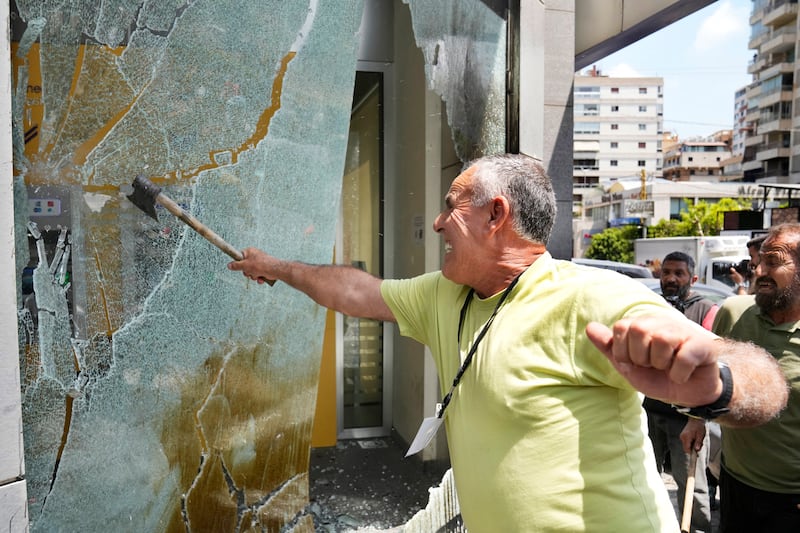Inflation in Lebanon hit an annual 254 per cent in June as a political impasse over the election of a president persisted and the term of the incumbent Central Bank Governor Riad Salameh nears its end with no successor in sight.
Hyperinflation continued for the 36th consecutive month as the country's currency continued to lose value on the parallel and official markets since it was devalued by 90 per cent at the start of February.
The increase in the cost of living was led by the soaring cost of housing, water, electricity, gas and other fuels, as well as a surge in the price of food and non-alcoholic beverages and transport, the Central Administration of Statistics' Consumer Price Index showed.
The CPI increased by about 7.2 per cent from May 2023.
Lebanon's inflation rate began to decline after hitting 171 per cent last year, the highest in about four decades, and 155 per cent in 2021.
However, it started to pick up early this year as the country's central bank devalued the Lebanese pound in February.
The official exchange rate changed to 15,000 pounds to the US dollar, compared with the peg in place since 1997 of 1,507.50 to the greenback.
Since 2019, the country has been in the grip of an economic crisis described by the World Bank as one of the worst in modern history.
It has yet to enforce critical structural and financial reforms required to unlock $3 billion of assistance from the International Monetary Fund, which could also pave the way for billions more in aid from other international donors.
Lebanon has been without a president since the end of October 2022, when the six-year term of Michel Aoun ended. It is being run by a caretaker cabinet led by Prime Minister Najib Mikati, with limited powers.
The election of a president requires the consensus of the country's political elite.
While the country is not new to political vacuums, which have stalled Lebanon's economic progress, the existing one is salient because it threatens the enactment of reforms deemed necessary for the nation to emerge from its worst financial crisis.
The country was without a president for two and a half years until Mr Aoun's election by the 128-seat parliament in 2016.
His predecessor, Michel Sleiman, was elected in 2008 with the help of Qatar, after 19 postponements in parliament, ending an 18-month political crisis.
Exacerbating the current crisis is uncertainty about a replacement for Mr Salameh, whose six-year term at the helm of Banque du Liban, Lebanon's central bank, ends on July 31.
He has been governor since 1993, when former prime minister Rafic Hariri, who he was a private banker to, appointed him to the position.
Successive governments had renewed his appointment and before the country's economic crisis, he was widely credited for steering Lebanon through conflicts with Israel and shielding the state's banks from the 2008 financial crisis by banning investment in the subprime mortgage market.
He was also favoured by Washington for helping to curtail Hezbollah's access to the banking system by shutting down the Canadian Lebanese Bank in 2011.
But after Lebanon defaulted on about $31 billion in eurobonds in March 2020 and its currency plunged against the dollar, fuelling inflation and a surge in poverty, the governor fell out of favour and has been blamed by many Lebanese for the crisis.
Mr Salameh is under investigation in six European countries, which accuse him of embezzling more than $330 million from Lebanon's central bank, with the help of his brother Raja, and using the proceeds to purchase luxurious properties in Europe.
He is also the subject of judicial inquiries at home but has denied any wrongdoing and consistently said the source of his personal wealth, before assuming his position as governor, was derived from a family inheritance and his time as a banker at Merrill Lynch.
Politicians have yet to agree on Mr Salameh's replacement, which makes navigating the crisis all the more difficult.

Earlier this month, Lebanon's central bank deputy governors called on authorities to urgently appoint a new chief to take over the reins from Mr Salameh, with the four deputy governors saying they would be forced to take action if a successor was not named soon.
According to protocol, Lebanon's central bank governor is appointed to a six-year term by the cabinet, on the recommendations of the finance minister.
Should the governor's position remain vacant after the mandate of Mr Salameh expires, Lebanon's laws stipulate that the first deputy governor takes over.
But Lebanese media have been rife with reports that the deputy governors will resign if a governor is not appointed when Mr Salameh's term expires.
This exacerbates the already perilous situation marred by informal capital controls imposed by banks that have restricted depositors' access to their funds, as well as rising poverty, suicides, emigration and crime.
Lebanese citizens, who have been unable to gain access to their savings, have staged a series of bank heists armed with anything from plastic or real guns, to grenades and Molotov cocktails in hopes of recovering their money.
In June, food prices which account for 20 per cent of the consumer price index, soared by 280 per cent while housing, water, electricity, gas and other fuels – which have a 28 per cent weighting – were up 208 per cent.
Health costs, which represent about 8 per cent of the index, rose 284 per cent and transport, which has a 13 per cent weighting, leapt 218 per cent.
Last month, the IMF warned that further delay of reforms would keep confidence low while cash dollarisation of the economy would increase, causing the national currency to depreciate further and keeping inflation high.
Lebanon's economy contracted by about 58 per cent between 2019 and 2021, with gross domestic product falling to $21.8 billion in 2021, from about $52 billion in 2019, according to the World Bank. It was the largest contraction on a list of 193 countries.
The World Bank estimates that real gross domestic product declined by 2.6 per cent in 2022 and is projected to contract 0.5 per cent this year.







